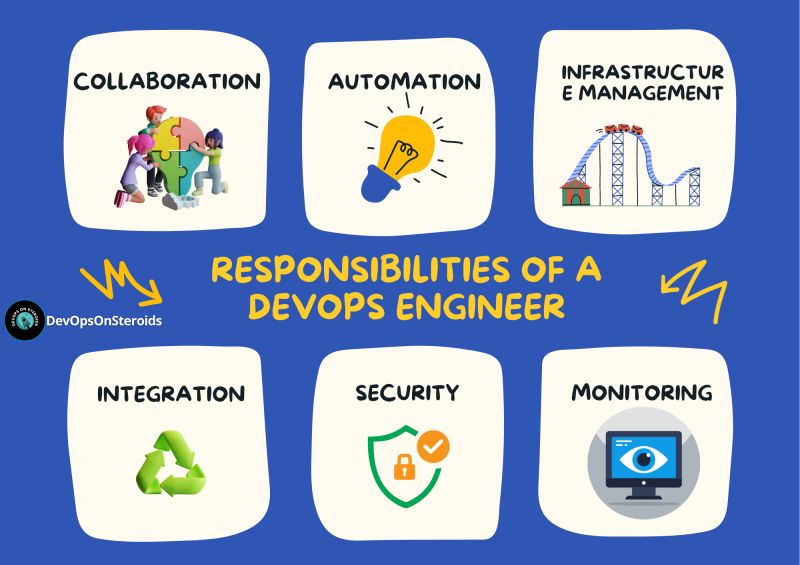what are the responsibilities of a devops engineer?
In the rapidly evolving tech landscape, the role of a DevOps engineer has become increasingly pivotal. Merging the expertise of development and operations teams, DevOps engineers drive efficiency, reliability, and faster time-to-market for software products. Here, we explore the diverse responsibilities that define this crucial role.
Fostering Collaboration Across Teams
DevOps engineers are the linchpin in fostering collaboration across development, operations, and other key stakeholders. By ensuring alignment of goals and priorities, they facilitate a culture of continuous improvement and shared responsibility, breaking down traditional silos that can hinder progress.
Automating for Efficiency and Reliability
Automation lies at the heart of DevOps. From continuous integration and delivery (CI/CD) pipelines to infrastructure provisioning and configuration management, automation streamlines processes, reduces errors, and enhances productivity. DevOps engineers design, implement, and maintain these automated processes, ensuring they are robust and scalable.
Mastering Infrastructure Management
With the adoption of Infrastructure as Code (IaC) tools like Terraform and CloudFormation, DevOps engineers manage infrastructure resources efficiently. They are responsible for optimizing scalability, performance, and cost, ensuring the infrastructure aligns with the evolving needs of the software and its users.
Tooling and Integration: The Backbone of DevOps
Identifying, evaluating, and integrating the right tools is crucial for the success of DevOps practices. From version control systems to CI/CD platforms and container orchestration tools, DevOps engineers ensure the tech stack supports optimal development and operational efficiency.
Ensuring System Reliability Through Monitoring and Observability
To maintain system reliability, DevOps engineers implement comprehensive monitoring and observability strategies. This includes tracking system performance, detecting anomalies, and establishing robust logging mechanisms for analysis, ensuring any issues are swiftly addressed.
Prioritizing Security and Compliance
Integrating security best practices into the development lifecycle is non-negotiable. DevOps engineers play a key role in embedding security controls, performing vulnerability assessments, and ensuring compliance with regulatory requirements, safeguarding against potential threats.
Embracing Continuous Improvement
The drive for continuous improvement is a hallmark of the DevOps philosophy. Analyzing workflows, identifying bottlenecks, and implementing process improvements are routine tasks for DevOps engineers, aimed at boosting efficiency and accelerating delivery.
Crafting Strategic Deployment Approaches
DevOps engineers implement strategic deployment strategies such as canary releases, blue-green deployments, and feature flagging. These approaches minimize downtime and mitigate risks, enabling smoother and safer software releases.
Incident Management: Preparing for the Unexpected
Developing incident response plans and coordinating responses to production incidents are critical responsibilities. Through post-incident reviews and preventive measures, DevOps engineers work to minimize the recurrence of issues, enhancing system stability.
Optimizing Performance for Scalability
Performance optimization is key to scalability and user satisfaction. DevOps engineers focus on identifying bottlenecks and tuning system configurations to improve performance, ensuring the infrastructure can support growing demands.
Forecasting with Capacity Planning
Through capacity planning, DevOps engineers forecast resource requirements, analyze utilization patterns, and scale resources accordingly. This proactive approach ensures the infrastructure adapts to changing needs efficiently.
Designing for Disaster Recovery
In the face of system failures or outages, having a solid disaster recovery plan is crucial. DevOps engineers ensure data integrity and strive to minimize recovery times, preparing for worst-case scenarios with robust recovery strategies.
In conclusion, the role of a DevOps engineer is multifaceted and critical to the success of modern software development and operations. Through collaboration, automation, strategic planning, and continuous improvement, they ensure the delivery of high-quality software at speed, meeting the demands of today’s fast-paced digital world.


0 Comments:
Post a Comment
Note: only a member of this blog may post a comment.
<< Home